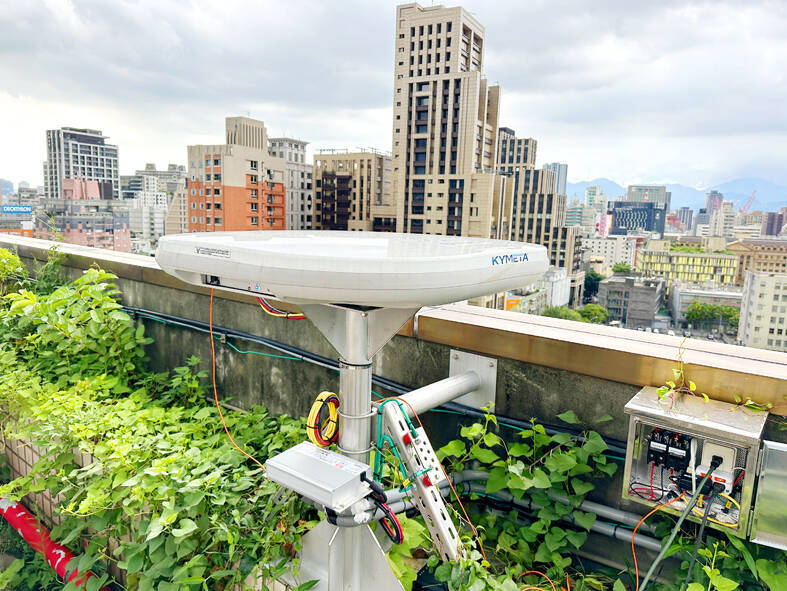The administration of US President Donald Trump should “support Taiwan’s development of strong satellite communications” in low Earth orbit, two academics wrote in an article published in Foreign Affairs on Thursday.
Daniel Byman, a professor at the Walsh School of Foreign Service at Georgetown University, and Seth Jones, a former US Department of Defense official, made the call in an article titled “How to Toughen Up Taiwan — America Must Help the Island Deal With China’s Gray Zone Tactics.”
Jones is the senior vice president and Harold Brown Chair at the Center for Strategic and International Studies. His research focuses on international security, warfare, irregular threats and terrorism, his Foreign Affairs description says.

Photo: CNA
Taiwan’s telecommunications infrastructure is vulnerable to “subversion,” the academics said.
They cited two events as examples.
In February 2023, two Chinese merchant vessels cut undersea cables connecting Taiwan proper to Lienchiang County, disrupting Internet communications, they said.
“This January, a Chinese-linked cargo vessel damaged another undersea fiber-optic cable — one of only 14 such cables linking Taiwan to the rest of the world,” they said.
Taiwan relies on European satellite operator Eutelsat OneWeb for low Earth-orbit satellite services and backup microwave communications, but the operator lacks sufficient bandwidth to be a substitute for Taiwan’s fiber-optic cables, Byman and Jones wrote.
Taiwan needs a powerful satellite service to reduce its reliance on undersea cable networks, they said, suggesting that Taiwan collaborate with Amazon.com’s Project Kuiper broadband Internet satellite constellation.
“Taiwanese leaders are already in discussions with Kuiper, but they need to move toward a deal more quickly, and Kuiper needs to increase its satellite launches in” low Earth orbit, they said.
Taiwan should work with US cloud services such as Google, Microsoft and Amazon Web Services to store backups of critical data, they said.
While it is understandable that governments prefer to buy local, important data are more vulnerable to China’s cyberattacks, espionage, physical destruction or other attacks if it is all stored by Taiwanese firms, Byman and Jones wrote.
The article also urged Taipei to issue more urgent warnings about Beijing’s aggressive actions, with the Chinese People’s Liberation Army having “engaged in a conspicuous military buildup and ramped up its cable-cutting, cyberattacks, air and naval encroachments, and military exercises, including a simulated blockade of Taiwan.”
The authors acknowledged that there might be concerns about spooking Taiwanese by stating the extent of China’s threat, but suggested that Taiwan set up a public data-driven communications platform that sends regular alerts about Chinese actions on or near Taiwan.
Such a system could help foster “public dialogue ... [and] give citizens tools to discern between actual threats and misinformation,” they said.
“Taiwan should develop a more unified strategic communications campaign across its government ministries to ensure that consistent messages about the threat level are communicated to the Taiwanese people,” they said.

Taiwan is stepping up plans to create self-sufficient supply chains for combat drones and increase foreign orders from the US to counter China’s numerical superiority, a defense official said on Saturday. Commenting on condition of anonymity, the official said the nation’s armed forces are in agreement with US Admiral Samuel Paparo’s assessment that Taiwan’s military must be prepared to turn the nation’s waters into a “hellscape” for the Chinese People’s Liberation Army (PLA). Paparo, the commander of the US Indo-Pacific Command, reiterated the concept during a Congressional hearing in Washington on Wednesday. He first coined the term in a security conference last

A magnitude 4.3 earthquake struck eastern Taiwan's Hualien County at 8:31am today, according to the Central Weather Administration (CWA). The epicenter of the temblor was located in Hualien County, about 70.3 kilometers south southwest of Hualien County Hall, at a depth of 23.2km, according to the administration. There were no immediate reports of damage resulting from the quake. The earthquake's intensity, which gauges the actual effect of a temblor, was highest in Taitung County, where it measured 3 on Taiwan's 7-tier intensity scale. The quake also measured an intensity of 2 in Hualien and Nantou counties, the CWA said.

The Overseas Community Affairs Council (OCAC) yesterday announced a fundraising campaign to support survivors of the magnitude 7.7 earthquake that struck Myanmar on March 28, with two prayer events scheduled in Taipei and Taichung later this week. “While initial rescue operations have concluded [in Myanmar], many survivors are now facing increasingly difficult living conditions,” OCAC Minister Hsu Chia-ching (徐佳青) told a news conference in Taipei. The fundraising campaign, which runs through May 31, is focused on supporting the reconstruction of damaged overseas compatriot schools, assisting students from Myanmar in Taiwan, and providing essential items, such as drinking water, food and medical supplies,

New Party Deputy Secretary-General You Chih-pin (游智彬) this morning went to the National Immigration Agency (NIA) to “turn himself in” after being notified that he had failed to provide proof of having renounced his Chinese household registration. He was one of more than 10,000 naturalized Taiwanese citizens from China who were informed by the NIA that their Taiwanese citizenship might be revoked if they fail to provide the proof in three months, people familiar with the matter said. You said he has proof that he had renounced his Chinese household registration and demanded the NIA provide proof that he still had Chinese